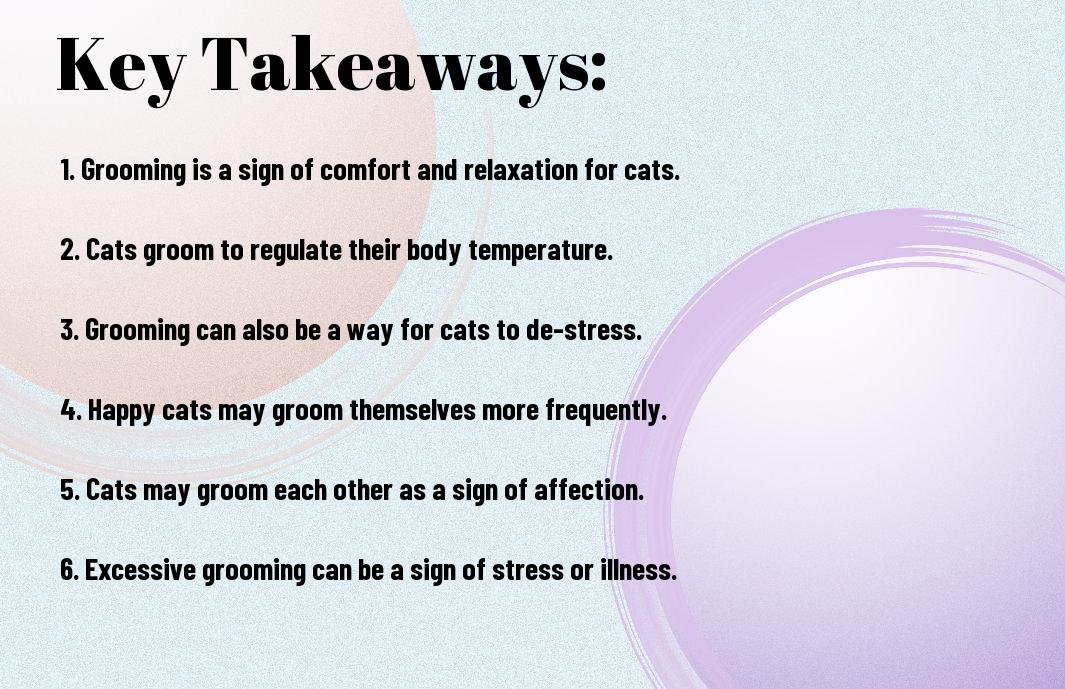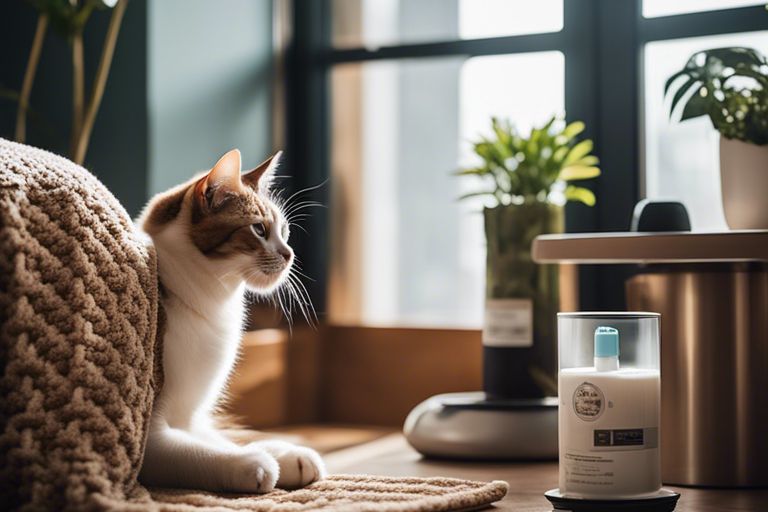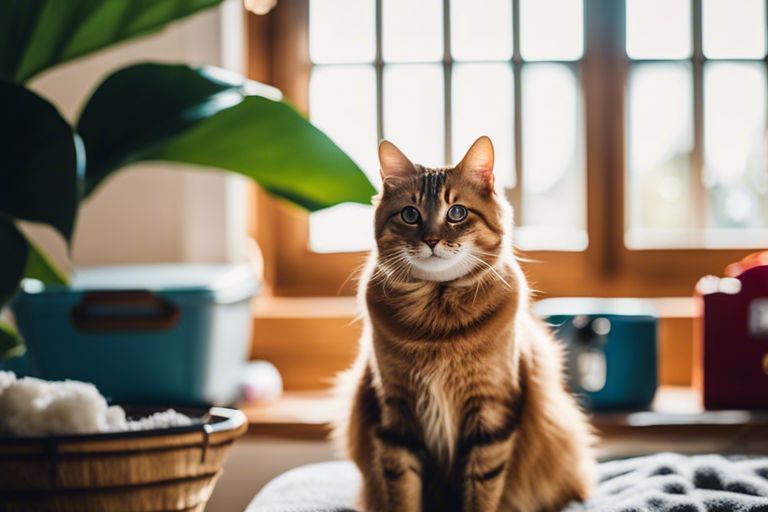Have you ever wondered why your feline companion seems to spend hours grooming itself? It’s a common behavior among cats, and it serves several important purposes. Not only does grooming help keep their fur clean and free of parasites, but it also plays a crucial role in maintaining their emotional well-being. When a cat is feeling content and happy, it will often groom itself more frequently and with greater intensity. This soothing behavior can help reduce stress and anxiety, as well as strengthen the bond between you and your furry friend. However, it’s important to be aware that excessive grooming could also be a sign of underlying health issues, so it’s crucial to monitor your cat’s grooming habits closely. In this post, we’ll explore the connection between a cat’s emotional state and its grooming behavior, so you can better understand and care for your beloved pet.

The Science Behind Feline Grooming
Obviously, cats spend a significant amount of time grooming themselves each day. This behavior may seem second nature to them, but there is actually a lot of science behind why cats groom themselves and what it means for their overall well-being.
What Is Self-Grooming for Cats?
Self-grooming is a natural behavior for cats, and it serves several important purposes. When your cat licks and grooms itself, it is not just about keeping its fur clean. This grooming also helps to regulate body temperature, remove loose fur, and stimulate the production of natural oils in the skin. Additionally, grooming helps cats to relax and alleviate stress, as it mimics the soothing sensation of being groomed by their mother as kittens. Grooming also helps cats to maintain a sense of control and comfort in their environment, which is crucial for their overall well-being.
The Connection Between Grooming and Emotions
There is a strong connection between a cat’s emotional state and its grooming behavior. Stress, anxiety, and fear can all impact how much a cat grooms itself. If your cat is feeling anxious or insecure, you may notice an increase in grooming as a way for them to self-soothe. On the other hand, if your cat is relaxed and content, you may see them groom themselves less frequently. It’s important to pay attention to changes in your cat’s grooming habits, as excessive grooming or a sudden decrease in grooming may indicate an underlying emotional issue that needs to be addressed. Your cat’s grooming behavior can be a valuable indicator of their emotional well-being, so it’s important to monitor it closely.
By understanding the science behind feline grooming, you can gain insight into the importance of this behavior for your cat’s physical and emotional well-being. The bond between grooming and emotions is a crucial aspect of feline behavior, and being aware of your cat’s grooming habits can provide valuable information about their overall health and happiness.

Indicators of Feline Happiness
If you are wondering whether your cat is happy, there are a few key indicators to look out for. Cats have different ways of expressing their contentment, and understanding these signs can help you ensure that your feline friend is leading a happy and fulfilling life.
Behavioral Clues
When your cat is happy, you may notice certain behavioral cues that indicate their contentment. Some of these behaviors include purring, kneading, and playful interactions with you or other pets in the household. Happy cats are also more likely to engage in grooming and stretching activities, exhibiting a sense of relaxation and comfort in their environment.
Physiological Signs
Physiological signs can also provide insight into your cat’s happiness. A contented cat will have a relaxed posture, with their ears facing forward and tail held high. You may also observe them blinking slowly or having dilated pupils, both of which are positive indicators of their well-being. Additionally, a healthy appetite, glossy coat, and clean ears and eyes are all signs of a happy and healthy cat.
By paying attention to these important behavioral and physiological indicators, you can better understand your cat’s emotional state and positively contribute to their happiness and well-being. Remember to always provide a safe and enriching environment for your feline friend, and consult with a veterinarian if you have any concerns about their happiness or overall health.
Observational Studies and Findings
Keep in mind that while cats are known for their grooming habits, the behavior can vary greatly from one cat to another. Observational studies have shown that some cats groom themselves frequently, while others do so less often. This variation in grooming behavior can be influenced by factors such as age, breed, health, and overall temperament.
Patterns in Grooming Behavior
When it comes to grooming behavior, you may notice certain patterns in your cat’s habits. Some cats may groom themselves for long periods of time, while others may only engage in quick grooming sessions. Additionally, you may observe that your cat grooms itself more often during specific times of the day, such as after a meal or when it’s feeling particularly relaxed.
Correlation Between Happiness and Grooming
There is a strong correlation between a cat’s overall happiness and its grooming habits. When a cat is content and relaxed, you may notice an increase in grooming behavior. On the other hand, a cat that is stressed or anxious may groom itself less frequently. This correlation emphasizes the importance of monitoring your cat’s grooming habits as a potential indicator of its emotional well-being.

Factors Influencing Grooming
After observing your cat closely, you may notice that grooming behavior can be influenced by various factors. Here are some of the most common factors that can affect your cat’s grooming habits:
- Age: Older cats may groom themselves less due to decreased flexibility and mobility.
- Stress: Cats may groom excessively when stressed or anxious as a coping mechanism.
- Health: Illness or pain can lead to decreased grooming behavior in cats.
- Environmental changes: Moving to a new home or introduction of a new pet can affect a cat’s grooming routine.
Knowing how these factors can influence your cat’s grooming behavior can help you understand and address any changes in their grooming habits.
Environmental and Social Influences
Your cat’s grooming behavior can be influenced by environmental and social factors. Changes in their environment such as moving to a new home, introduction of a new pet, or even changes in their daily routine can affect their grooming habits. Additionally, social interactions with other pets or humans can also influence their grooming behavior. For example, if your cat is stressed due to a new pet in the household, they may groom themselves excessively as a coping mechanism. On the other hand, a happy and content cat may engage in social grooming with other cats in the household, contributing to their overall well-being.
Health and Psychological Aspects
Health and psychological factors can also play a significant role in your cat’s grooming behavior. Illness, pain, or discomfort can lead to a decrease in grooming behavior, as your cat may not have the energy or desire to engage in grooming. Conversely, excessive grooming can be a sign of underlying health issues such as skin irritation, allergies, or psychological stress. It’s important to monitor your cat’s grooming habits and seek veterinary attention if you notice any significant changes.
Does Cats’ Grooming Behavior Change Depending on Their Mood?
Cats’ grooming behavior can indeed change based on their mood. When they’re relaxed and content, they may meticulously groom themselves. On the other hand, if they’re stressed or anxious, they might overgroom as a coping mechanism. Understanding the reasons for cat grooming behavior can help us better address their emotional needs.
Can Grooming Habits Indicate the Happiness of a Himalayan Cat?
Regular himalayan cat grooming tips are essential for maintaining a healthy and happy pet. Keeping their coat clean and free of mats can indicate their overall well-being. A neatly groomed himalayan cat is often a sign of its contentment and good health.
Final Thoughts
The grooming habits of cats can give you important insight into their emotional state. When a cat is happy and content, they are more likely to groom themselves regularly. This behavior not only helps them maintain a clean and healthy coat, but it also serves as a form of self-soothing and stress relief. By observing your cat’s grooming habits, you can better understand their overall well-being and make adjustments to their environment to ensure they remain a happy and healthy companion. Encouraging regular grooming behavior in your cat is an important part of maintaining their overall happiness and wellness.
FAQ
Do cats groom themselves when happy?
Yes, cats often groom themselves when they are happy. Grooming is a natural behavior for cats and they will often engage in it when they are feeling content and relaxed.
Why do cats groom themselves when happy?
Cats groom themselves as a way to maintain their hygiene and cleanliness. When they are happy and relaxed, they are more likely to engage in grooming as a way to self-soothe and maintain their well-being.
Are there other reasons why cats groom themselves?
Yes, aside from maintaining hygiene, cats also groom themselves to regulate their body temperature, to distribute natural oils on their skin and fur, and to remove loose and dead hair. Grooming also helps cats calm themselves in stressful situations and can act as a bonding behavior between cats in a social group.

Hello there, I am Iftekhar Ahmed. I am the owner of Mishka & The Cat Corners. I love to explore and write on various topics about cats

